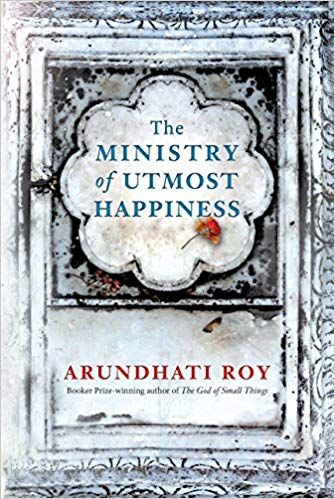Book Review: The Ministry Of Utmost Happiness
May 03, 2019 • 15 views

The ministry of utmost happiness is written by one of India's celebrated authors Arundathi Roy, who is also the author of several other best selling novels like 'The God of Small Things', 'Broken Republic' and 'The Algebra of Infinite Justice'.
The ministry of utmost happiness revolves around the life of little Aftab, who unlike his peers aspires to be a woman. It all began when he saw a gorgeously dressed transgender walking freely on the 'biased' streets of Old Delhi, not giving a care about the opinion of the society. He later follows her into what was known as the 'Khwabgah'- the house of dreams, where the refused became the refugees. He leaves his home much to the anguish of his mother and shifts into the Khwabgah, assuming his new identity as Anjum.
A lot of changes happen in Anjum's life as well as in her body. She loses her beautiful voice and a strange turn of events introduces Zainab into her life, who was an abandoned baby that she decides to adopt. Meanwhile, the author directs the attention of the reader to the political scenario of the country at the time; a chain of events results in a religious outbreak in some part of the country and Anjum finds herself caught amidst this chaos. What happens there changes her life forever; she leaves Khwabgah to live in a graveyard instead.
She meets Saddam Hussain, a 'Chamar', who lives with her in the makeshift room she builds in the graveyard and calls 'Jannath'-paradise. Slowly, with the passage of time, she opens up to her friends and family in an attempt to heal the wounds of the past. Many years later they are visited by Tilottama, whose life story is described in the second half of the book.
Tilottma and her group of college friends separate after their college days and flow in different directions. One of them becomes a popular journalist, one becomes a bureaucrat whereas the other one grows up to fight for the freedom of his motherland Kashmir. by joining the militant side. They cross each others paths several years later, mostly because of each one's infatuation with Tilo.
The author lucidly and diplomatically captures the struggles of Kashmir and its conquest for 'Azadi' through the perspectives of the militants and the military, Kashmiris and the non-Kashmiris, and the undead and the dead (martyrs). The novel finishes with the picture of the happy and smiling faces of Anjum and her friends who live in the 'Jannath'- a world of their own amidst the world of the rest.
Why is the book worth reading?
Arundathi Roy has used a perspicuous style of narration to capture the beauty of the old streets of Delhi and its enchanting charm. She very diplomatically writes about the intricate relationship between the Hindus and the Muslims, and the delicate string of balance between the two religions.
The book is an eye opener to the life and plight of the 'other' community (transgenders) whose very existence is a sin to the society. The author attempts to describe the life of the untouchable community as well and sheds light into their misery.
The heart wrenching story of Kashmir, where from time to time normalcy is declared has been explicitly written. While some content of the book may be quite offensive to the sensitive-minded readers, this book can be best described as a stinging satire on the ironies of the society and democratic system, and is a great feast for someone who's looking for a realisation.
